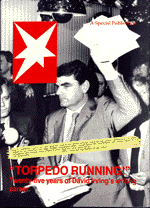The "Hitler Diaries" WHEN Stern magazine held their sensational Hamburg press conference to announce the find of "Hitler's Diaries" on April 25, 1983, David Irving was smuggled in as special correspondent for the rival Bild mass-circulation newspaper with the task of torpedoing it. Bild editors knew that Irving alone had duplicate copies of the fake Hitler documents, including pages of the "diaries" that Stern actually began publishing that day, closely followed by Newsweek in New York and the Sunday Times in London. Adopting high-powered marketing methods at their press conference to sell the multi-million dollar diaries, Stern began by presenting to the hundreds of television and newspaper journalists a one-hour video film describing how the documents had been found in East Germany by their star journalist Gerd Heidemann. On this video film German television journalist Klaus Harpprecht, hired to speak the commentary, warned that there would probably be those who would impugn the authenticity of the diaries, including historians with, as he over -- boldly put, "no reputation to lose, like David Irving. " Seconds later Stern's executives bit their tongue when they realised that Irving was actually in their midst. When Stern editor Peter Koch (later dismissed) called for questions, Irving got to the floor microphone first, whispered "Torpedo running!" to the Bild editors who had accompanied him, and brandished on high the documents that proved the whole multi-million dollar batch of diaries and documents to be counterfeit. In four deadly questions Irving asked
Without answering these questions, Stern officials on the stage ordered the microphone switched off. The press conference broke up in fist-fights and shambles. Irving was physically escorted from the room. But his torpedo had struck home. |
A few days later West German forensic scientists confirmed what Irving had declared: tests on the ink, paper and glue proved the diaries were fake. IRVING HAD obtained his copies of the documents during routine historical research in West Germany as early as December 1982, and had concluded a few days later that the documents were entirely faked. He had written warning letters on December 16 to journalist Heidemann, to millionaire Stuttgart entrepreneur Fritz Stiefel, to Munich document authenticator Professor August Priesack and to the Texas autograph collector Billy Price explaining why the documents were clearly faked. Most blatant among the fakes was a "Göring letter" dated July 23, 1944, typed on printed stationery headed REICHSMARSALL instead of REICHSMARSCHALL. When features editor Magnus Linklater of the London Sunday Times telephoned him later that month, December 1982, after negotiating with him for weeks to obtain access to the documents, Irving also warned him that he had concluded that the diaries and documents were faked. He declined the Sunday newspaper's offer to write a feature article on Hitler forgeries. Disregarding Linklater's earlier promise not to go behind Irving's back, the newspaper cynically went ahead with its own plans and started publication in April 1983. It paid a savage price, becoming like Stern an international laughing stock for weeks. THE DIARIES had been faked, it turned out, by Konrad Kujau, a gifted Stuttgart confidence trickster. Irving located Kujau's abandoned ''workshop" in May 1983. He pointed out to accompanying journalists that the word "MILITARIA" on the bellpush was in the same typeface as the word REICHSMARSALL on the stationery. Irving was in court in Hamburg on July 8, 1985, to
hear sentence passed on Kujau, who had confessed to
forging the documents, and
journalist Gerd
Heidemann. The judge exonerated Heidemann of
any charge of forgery, but imposed a prison term on both
men: because the mystery of Stern's missing
millions remains unsolved. |
 NBC's
Frankfurt correspondent rushed Irving across Hamburg to a
studio for a live satellite link-up with their morning
television programme "Today", broadcast coast to coast in
the United States one hour later. Rival company ABC
showed Irving and documents that night on
"Nightline".
NBC's
Frankfurt correspondent rushed Irving across Hamburg to a
studio for a live satellite link-up with their morning
television programme "Today", broadcast coast to coast in
the United States one hour later. Rival company ABC
showed Irving and documents that night on
"Nightline".